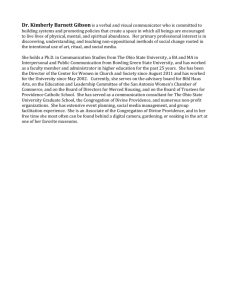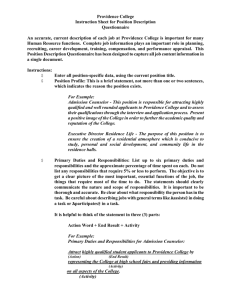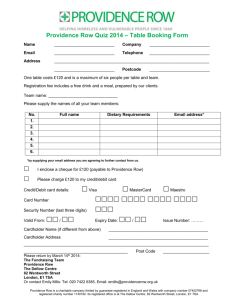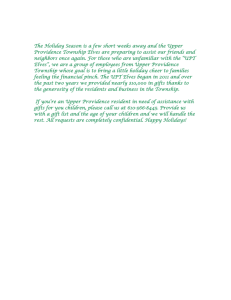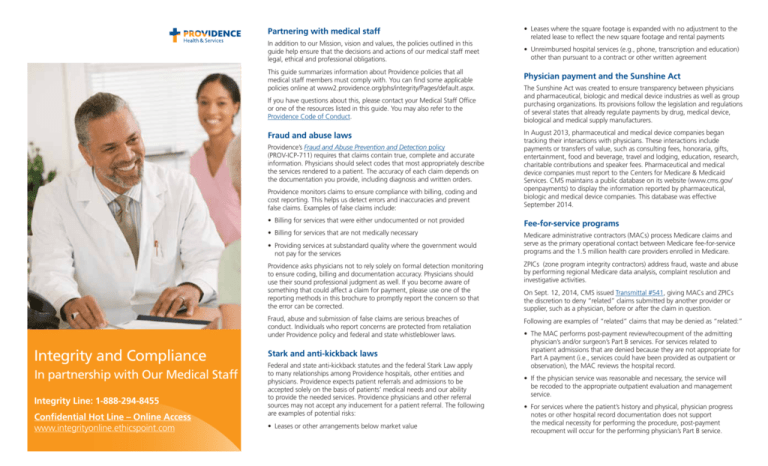
Partnering with medical staff
In addition to our Mission, vision and values, the policies outlined in this
guide help ensure that the decisions and actions of our medical staff meet
legal, ethical and professional obligations.
This guide summarizes information about Providence policies that all
medical staff members must comply with. You can find some applicable
policies online at www2.providence.org/phs/integrity/Pages/default.aspx.
If you have questions about this, please contact your Medical Staff Office
or one of the resources listed in this guide. You may also refer to the
Providence Code of Conduct.
Fraud and abuse laws
Providence’s Fraud and Abuse Prevention and Detection policy
(PROV-ICP-711) requires that claims contain true, complete and accurate
information. Physicians should select codes that most appropriately describe
the services rendered to a patient. The accuracy of each claim depends on
the documentation you provide, including diagnosis and written orders.
Providence monitors claims to ensure compliance with billing, coding and
cost reporting. This helps us detect errors and inaccuracies and prevent
false claims. Examples of false claims include:
In partnership with Our Medical Staff
Integrity Line: 1-888-294-8455
Confidential Hot Line – Online Access
www.integrityonline.ethicspoint.com
• Unreimbursed hospital services (e.g., phone, transcription and education)
other than pursuant to a contract or other written agreement
Physician payment and the Sunshine Act
The Sunshine Act was created to ensure transparency between physicians
and pharmaceutical, biologic and medical device industries as well as group
purchasing organizations. Its provisions follow the legislation and regulations
of several states that already regulate payments by drug, medical device,
biological and medical supply manufacturers.
In August 2013, pharmaceutical and medical device companies began
tracking their interactions with physicians. These interactions include
payments or transfers of value, such as consulting fees, honoraria, gifts,
entertainment, food and beverage, travel and lodging, education, research,
charitable contributions and speaker fees. Pharmaceutical and medical
device companies must report to the Centers for Medicare & Medicaid
Services. CMS maintains a public database on its website (www.cms.gov/
openpayments) to display the information reported by pharmaceutical,
biologic and medical device companies. This database was effective
September 2014.
• Billing for services that were either undocumented or not provided
Fee-for-service programs
• Billing for services that are not medically necessary
Medicare administrative contractors (MACs) process Medicare claims and
serve as the primary operational contact between Medicare fee-for-service
programs and the 1.5 million health care providers enrolled in Medicare.
• Providing services at substandard quality where the government would
not pay for the services
Integrity and Compliance
• Leases where the square footage is expanded with no adjustment to the
related lease to reflect the new square footage and rental payments
Providence asks physicians not to rely solely on formal detection monitoring
to ensure coding, billing and documentation accuracy. Physicians should
use their sound professional judgment as well. If you become aware of
something that could affect a claim for payment, please use one of the
reporting methods in this brochure to promptly report the concern so that
the error can be corrected.
ZPICs (zone program integrity contractors) address fraud, waste and abuse
by performing regional Medicare data analysis, complaint resolution and
investigative activities.
Fraud, abuse and submission of false claims are serious breaches of
conduct. Individuals who report concerns are protected from retaliation
under Providence policy and federal and state whistleblower laws.
Following are examples of “related” claims that may be denied as “related:”
Stark and anti-kickback laws
Federal and state anti-kickback statutes and the federal Stark Law apply
to many relationships among Providence hospitals, other entities and
physicians. Providence expects patient referrals and admissions to be
accepted solely on the basis of patients’ medical needs and our ability
to provide the needed services. Providence physicians and other referral
sources may not accept any inducement for a patient referral. The following
are examples of potential risks:
• Leases or other arrangements below market value
On Sept. 12, 2014, CMS issued Transmittal #541, giving MACs and ZPICs
the discretion to deny “related” claims submitted by another provider or
supplier, such as a physician, before or after the claim in question.
• The MAC performs post-payment review/recoupment of the admitting
physician’s and/or surgeon’s Part B services. For services related to
inpatient admissions that are denied because they are not appropriate for
Part A payment (i.e., services could have been provided as outpatient or
observation), the MAC reviews the hospital record.
• If the physician service was reasonable and necessary, the service will
be recoded to the appropriate outpatient evaluation and management
service.
• For services where the patient’s history and physical, physician progress
notes or other hospital record documentation does not support
the medical necessity for performing the procedure, post-payment
recoupment will occur for the performing physician’s Part B service.
Physician-owned distributorships
PODs are arrangements involving medical device companies and physicians
who control medical device decisions and who share in the profits
generated by the sale of such devices.
Providence policy prohibits physician involvement in PODs.
Physicians may also use their ability to generate hospital referrals and
induce hospitals to purchase medical devices in which the physicians have
ownership. These arrangements may be unethical or illegal. Under the
physician payment Sunshine Act, these relationships must be disclosed to
CMS.
Conflicts of interest
Conflicts of interest occur when personal interests or activities influence or
appear to influence actions and decisions.
Examples include:
• Using your influence to recommend the selection of a vendor, contractor,
product or supplier, including medical devices and pharmaceuticals,
when you have a financial interest (such as accepting consulting or
speaking fees) or ownership interest in the service or product
• Accepting monetary or in-kind gifts from a vendor or contractor as an
inducement to use your influence or position.
If you believe a possible conflict of interest may exist, then treat the
situation as if a conflict does exist: Disclose and resolve the matter. If you
have questions, contact your Medical Staff Office or one of the resources
listed in this guide.
Patient information and security
Patient protected health information (PHI), personally identifiable
information (PII) and other confidential information require special care.
Consistent with the Health Insurance Portability and Accountability Act
of 1996 (HIPAA) and state privacy laws, PHI may not be used or disclosed
except:
• To provide care for the patient
• For payment or health care operations purposes
• If the disclosure is required by law
• If the patient has authorized the disclosure
• If the disclosure is otherwise specifically permitted under Providence
policy or Providence’s Notice of Privacy Practices
As a physician, you have a responsibility to ensure that your staff and
agents acting on your behalf comply with the following privacy and security
guidelines:
• Providence-related PHI should only be accessed when there is a legitimate
business need
• A patient’s PHI/PII should not be discussed in public areas
• PHI/PII should never be posted on social media sites
• Passwords should never be shared
Providence policy prohibits anyone, including physicians, from accessing their
own medical records and requires that we follow patient access procedures.
If taking Providence-related patient information off site using a mobile device
(e.g., a cellphone, CD, DVD, flash drive, laptop), you are responsible to keep
that device secure and in your possession at all times until that device can
be secured. These measures are not only essential for the protection of our
patients, Providence and you, but they also maintain our integrity and keep
patient trust intact.
Ethical and religious directives
As a Catholic health care organization, we require adherence to all
Ethical and Religious Directives as a condition of medical privileges and
employment. The Ethical and Religious Directives reaffirm ethical standards
of behavior in health care concerning treatment and dignity of people and
provide guidance on certain ethical issues that face Catholic health care
today. To learn more, visit Ethical and Religious Directives.
Reporting process
You can report any concern by:
• Calling the Providence Integrity Line at 888-294-8455
• Contacting your local or regional integrity and compliance office or
medical group compliance officer
Providence is legally obligated to protect, remediate and report PHI/PII breaches
to the individual, state government and Department of Health and Human
Services in certain circumstances. If you are aware of a breach relating to
Providence PHI/PII, please immediately report the concern to one of the
resources listed in this guide.
• Using the identified process in your Medical Staff Office
Excluded providers
Regional Integrity, Compliance & Privacy
Alaska 907-212-3008
California 818-847-3140
Northwest Washington 425-254-5329
Oregon 503-216-4472
Providence Health Care 509-474-7320
Providence Senior & Community Services 425-254-5329
Providence Strategic & Management Services 425-525-3709
Southeast Washington 509-474-7320
Southwest Washington 206-215-2605
Swedish: 425-525-5612
Western Montana 509-474-7320
As a recipient of funds from Medicare, Medicaid/Medi-Cal and other federal
and state health programs, Providence is prohibited from submitting any claim
for services ordered, prescribed or provided by individuals or organizations
excluded from participation in federal or state health care programs. If you are
notified by CMS of exclusion, you should promptly notify your Medical Staff
Office.
Medical identity theft
If you are treating a patient and suspect medical identity theft for any reason,
please immediately report the concern using your entity’s identified process or
by contacting one of the resources listed in this guide.
Respectful work environment
In keeping with the Providence core values of respect and compassion and to
maintain a respectful work environment for all, you should expect to be treated
with respect. In turn, we expect you to treat everyone you meet in our hospitals,
clinics and facilities with equal respect and fairness at all times.
No Providence medical staff member, employee, patient, family member or
visitor should tolerate disrespectful or disruptive behavior in any Providence
facility.
Providence expects medical staff members to promptly report all actual or
potential wrongdoing.
Resources
Integrity Line / Integrity Online
888-294-8455 (toll free, 24/7)
www.integrityonline.ethicspoint.com
Medical Staff Member Information:
See Integrity and Compliance intranet page at
http://www2.providence.org/phs/integrity/comped/Pages/default.aspx.
If you witness such behavior, please report it immediately to your Medical Staff
Office or one of the resources listed in this guide.
Copyright 2015, Providence Health & Services. All rights reserved.
SH14-55377

